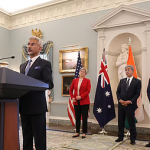In a world flooded with noise and distraction, with timelines that refresh but never reflect, we are forgetting not just the lessons of history—but the very soul of resistance. And yet, in the quiet margins of the heart, one name refuses to fade: Imam Hussain (AS). He is not just remembered—he is felt. He is not only mourned—he is enacted.
There are only two kinds of souls in the world: those who know they love Imam Hussain (AS), and those who do not yet realize that deep within them, in that primal cry for justice, in every tremor of moral courage—they too, are his companions. Because Imam Hussain (AS) is not merely a historical figure. He is the moral compass of the cosmos. He is the silence that condemns tyranny. The sigh that refuses surrender. The truth that bleeds but never bows.
Who is Imam Hussain (AS)? We may begin with lineage—the noblest of blood, the grandson of Prophet Muhammad (PBUH), son of Hazrat Ali (AS) and Syeda Fatima (SA). But that is only the gate. To know Imam Hussain (AS) is to step into a garden of meanings: a man without sin, whose every act was a mirror of divine will, whose martyrdom was a sermon of eternity. In him, Islam walked into the desert one last time—not to survive, but to testify. He is the sigh of the oppressed, heartbeat of the soul in exile, a flame that refuses to flicker in the winds of Yazid’s modern heirs.
In every age, in every self, the battle of Karbala replays. The battlefield is internal now. The Yazid of desire, of greed, of ego—the nafs-e-ammāra—still commands. But the banner of Imam Hussain (AS) is still raised by those who resist. In every struggle for justice, in every act of conscience, Imam Hussain (AS) lives. Azadari is not a ritual. It is sacred choreography—a dance of grief that awakens the conscience. It is a protest written in tears. A theology of memory against the tyranny of forgetting.
When the chest beats in lamentation, when the eyes swell with sorrow, it is not weakness—it is spiritual war. Mourning becomes resistance. Grief becomes a sword. Muharram is not about the past.It is the whisper of the cosmos: “Which side are you on?”. Because Yazid is not dead. Neither is Imam Hussain (AS). And silence is no longer neutral. There is a Hussain of historians, catalogued in facts. And there is a Hussain of poets, carved in light—the archetype of resistance, the soul of meta history.
Imam Hussain(AS) is not confined to Islam. The pathos of his sacrifice has pulled hearts across faiths and cultures. Mahatma Gandhi said, “I learned from Hussain how to be oppressed and yet victorious.” Tagore saw in him the highest expression of spiritual defiance.
The religion of love is not a metaphor—it is exemplified in the Prophet (PBUH), in Hazrat Ali (AS), in Fatima (SA), in Imam Hussain (AS). To mourn Imam Hussain (AS) is to affirm your humanity, to partake in the sorrow that refines the soul. Socrates once said, “An unexamined life is not worth living.”
Azadari is the examination of life under the lens of loss, loyalty and love. It is the refusal to normalize oppression. The refusal to forget the price of truth. Imam Hussain (AS) was not seeking victory. He was offering witness. He did not march to win a throne—he walked into Karbala to teach the world that some defeats are greater than victories. And so, he waits—not in the pages of history, but in the moral DNA of every just heart.
The lovers of truth keep his flame alive. It flickers in every stand against tyranny, in every act of conscience that says “No” when it is dangerous to say it. Azadari is not an annual ritual—it is a timeless declaration.It bridges the slain of Karbala with the awaited of Domsday (Qiyamah). It teaches us that the blood of the innocent is not erased—it irrigates the future.
That every act of remembrance is a rebellion against historical amnesia. So long as Imam Hussain (AS) is remembered, Yazid will never win. So long as there are tears for truth, swords of lies shall rust. And when the world forgets itself in distraction, the soul remembers—In Karbala, it remembers the price of dignity.
In Imam Hussain (AS), it remembers its highest self. Because Imam Hussain (AS) is not just a man. He is the whisper of God’s justice echoing through time. And the question that echoes with him, still, is not what side history was on. The question is: What side are we on now?
(The author is the Veterinary Assistant Surgeon in Animal Husbandry Department Government of Jammu and Kashmir. Feedback: [email protected])








